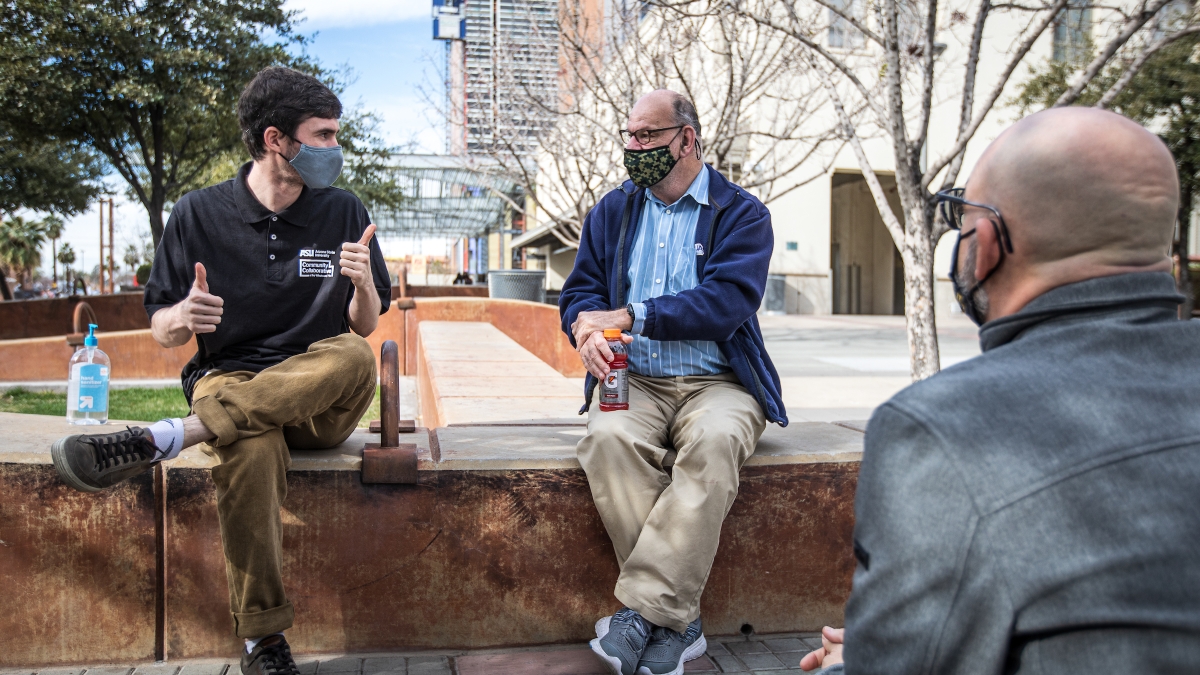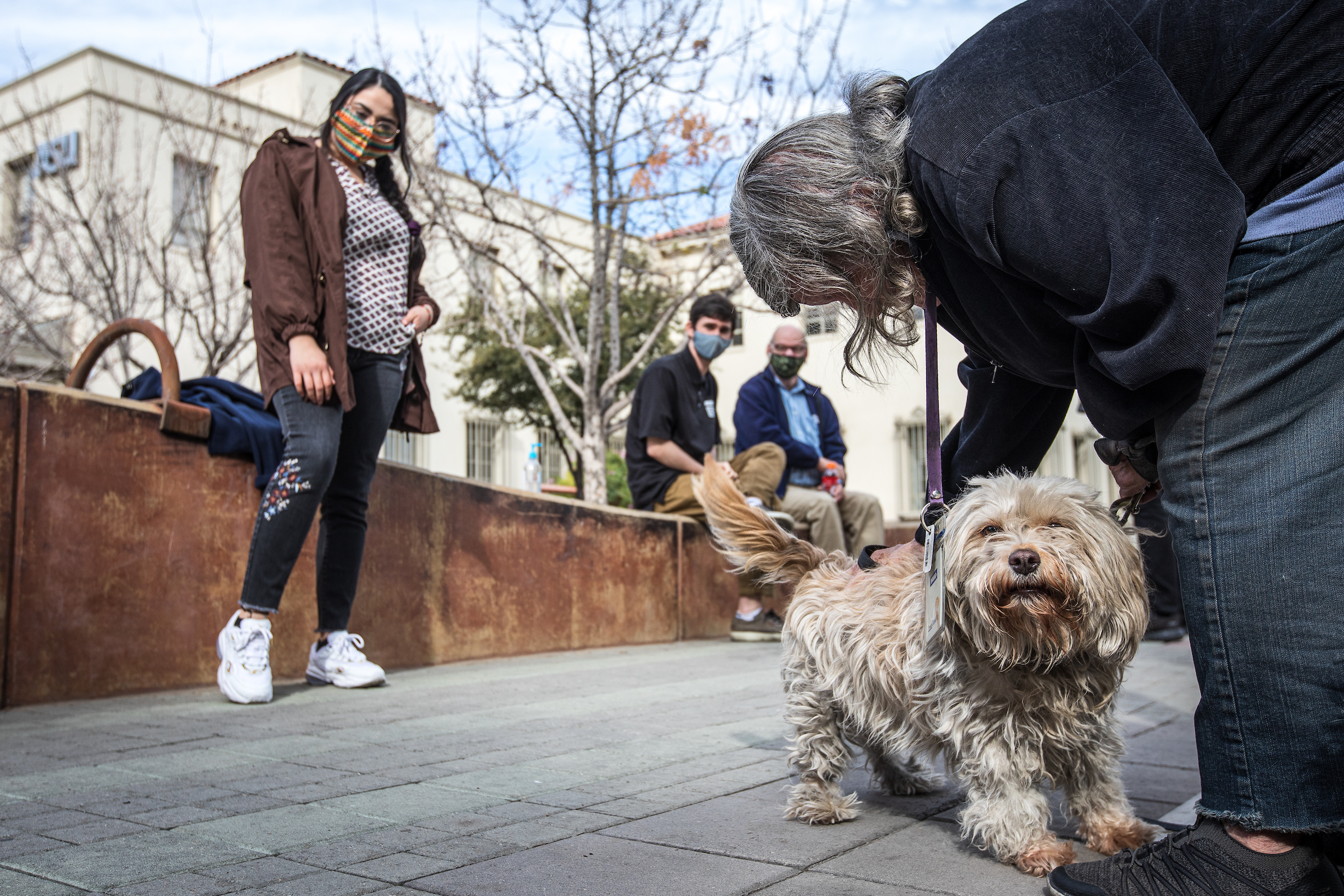The COVID-19 pandemic has been hardest on the most vulnerable people, and Arizona State University students have been working to help one group in downtown Phoenix.
Residents at the Westward Ho apartments – low-income older adults and those with disabilities – have faced extra burdens over the past year. A population that was already susceptible to loneliness was further isolated when they couldn’t see friends and family in person. They were unable to access services in their building, like the computer room, which was closed. Some residents didn’t always have enough to eat.
For several years, the ASU Community Collaborative has been supporting the Westward Ho residents, and while the COVID-19 pandemic created difficult challenges, that help has continued. Students checked in on the residents over winter break, made sure the food cart was stocked and are thinking of ways to resume some activities.
“In the fall, there were a lot of unknowns of what we were going to be able to do,” said Taylor Elliott, a Master of Social Work student and intern with the ASU Community Collaborative.
“We knew that as long as our ZIP code was in the red zone, we would not be open for services. The residents were losing hope because we would tell them we had to wait for the numbers to get better, and that was the only answer we had.
“Now, we’re doing what we can to find alternatives and to just make things work.”
Starting in January, the ASU team began offering several outdoor, socially distanced activities for the residents, including social hours and mindfulness sessions. More meetup groups are planned.
And the students also figured out how to help residents access computer time and other services.
The goal of the ASU Community Collaborative is twofold: to provide students with real-world experience and to enhance the quality of life for the residents. The ASU Community Collaborative, based on the first floor of the Westward Ho, includes the School of Social Work, the School of Community Resources and Development, the Edson College of Nursing and Health Innovation and the College of Health Solutions, coordinated by the Center for Applied Behavioral Health Policy.
Westward Ho resident Sharron Ross (right) plays with her dog, Tilly Suzanne, during a social meetup at Civic Space Park in downtown Phoenix. ASU School of Social Work student Adrine Rodriguez (left) is one of the interns who runs the weekly activity. Photo by Charlie Leight/ASU News
When the pandemic hit in March, in-person services such as counseling were switched to Zoom, which was very challenging, said Stacey Gandy, an instructor in the School of Social Work and the program coordinator for the ASU Community Collaborative.
“Many residents don’t have internet,” she said. “And navigating technology is hard. That’s one of the services we provide – teaching them how to navigate their phones and tablets – and we weren’t here to help them.”
With the summer to plan, the team was able to resume some services in the fall semester, including the food cart.
“When we came back in the fall, we got to hear for the first time what it was like for them over summer not having us here and not having the food cart when food was a big issue for them,” Elliott said. “So in the fall we had to get it back in shape.”
The students also made sure the food cart was stocked and open a few hours a week over winter break.
The ASU team then solved another problem. When Zoom didn’t work for counseling, the sessions were switched to phone calls. But many residents have a limited supply of minutes on their cellphones. So the collaborative opened a room in the lobby with a phone, and residents can use it one at a time, with cleaning in between visits.
Besides the counseling sessions, the students added “Phone Pals,” in which the students call residents just to chat.
“It’s to talk about what’s going on in their lives right now, like with their grandchildren or with friends who have gotten sick,” Gandy said.
“Sometimes it’s about arguments with neighbors. Part of what we’ve done in the past is help the residents resolve issues, so we help them work through those conflicts.”
Ron Bookman, who is pursuing his Master of Social Work degree, is an intern with the collaborative. He participated in the Phone Pals.
“I had residents tell me it made a difference in their day. Their demeanor would shift 180 degrees,” he said.
“We continued it over break because that’s when people needed it the most was over the holidays.”
While chatting, he would try to make sure that the residents’ basic needs were met.
“I would ask if they could get food and get to the doctor,” said Bookman, who runs the weekly mindfulness sessions outdoors for the residents.
Trying to solve access to technology has been a focus for everyone, Gandy said.
“The residents rely on our computer lab to do emails and such,” she said.
“So we’re trying to find ways to provide services in a safe way. We’re going to do a signup sheet and open the computer lab for 30-minute slots to one person at a time. When they leave, we’ll sanitize the space before the next one comes in.”
The collaborative is planning to add other services, including outdoor meetups for women and for pet owners, as well as an online pain-management group in which residents can borrow iPads to access the sessions.
Gandy said that the length of the pandemic disruption has started to wear on the residents.
“With some residents who struggle with anxiety, it created more anxiety. But for those who struggle with social anxiety, I think it relieved some of the pressure of having to interact with people,” she said.
“They could walk down the sidewalk and not have to worry about that social expectation. But even some of the ones who were doing OK in the fall are struggling because this has gone on so long.”
Bookman said that the students’ efforts to solve the pandemic challenges gets to the heart of social work.
“We are empathetic, but we also have to be adaptable,” he said.
“This got us working together and stretching our minds and working as a team. We’re really engaged, bouncing ideas off each other and thinking about the residents.”
Bookman said he sees the residents as his mentors.
“They’re helping me to be a better social worker and preparing me for my success,” he said. “They’re definitely helping me as much as I’m helping them.”
The ASU Community Collaborative accepts donations for its pantry of food and hygiene items. The items most needed are toilet paper, bar soap, laundry detergent pods and nonperishable sources of protein such as canned chicken, tuna, Spam and peanut butter. Email Stacey Gandy to set up a time for drop-off at sgandy@asu.edu.
Top image: School of Social Work graduate students Brandon Falk (left) and Ronald Bookman (right) chat with Westward Ho resident Douglas Meyer during an informal meetup in Civic Space Park in downtown Phoenix. The social-hour activity was started this semester by the ASU Community Collaborative as a way for residents to safely connect. Photo by Charlie Leight/ASU News
More Arts, humanities and education

ASU alum's humanities background led to fulfilling job with the governor's office
As a student, Arizona State University alumna Sambo Dul was a triple major in Spanish, political science and economics. After graduating, she leveraged the skills she cultivated in college —…

ASU English professor directs new Native play 'Antíkoni'
Over the last three years, Madeline Sayet toured the United States to tell her story in the autobiographical solo-performance play “Where We Belong.” Now, the clinical associate professor in…

ASU student finds connection to his family's history in dance archives
First-year graduate student Garrett Keeto was visiting the Cross-Cultural Dance Resources Collections at Arizona State University as part of a course project when he discovered something unexpected:…

